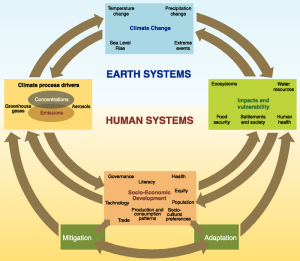Anthropogenic climate change is one of the, if not the most, pressing issues of our times. The problems that it causes range across many social and environmental domains from habitat and species loss and displacement to the more human and social concerns and issues of access to water, sea level rise that affects coastal communities, to economic degradation as a result of the aforementioned and other connected issues such as increased frequency of storms, droughts, wildfires, and the like. We also know that the affects of climate change are not distributed evenly across populations- that many will and do feel the negative effects of this slow developing problem earlier and more intensely than others based on where they are located both geographically and within economic and other socio-cultural hierarchies.
We also know that recently, there is a marked effort to begin to move away from simply decrying the horrors of climate change to a continued recognition of those horrors as they exist now and into the future alongside attempts to begin to come to terms with the changing climate and to rethink the ways that our social and environmental relations and communities are organized with an eye toward both adapting to these changes and mitigating further damage. There is, however, much work to be done.
This book was co-authored by undergraduate students at Worcester Polytechnic Institute while exploring the influences of Earth systems and human systems on climate change and the communities at most risk in an interdisciplinary project-based first year course (Fig 1 below). This course attempts to bring together knowledge of the science of ecological and climate systems and their changing status with knowledge of the social and communal structures within which these systems are embedded and through which they have been influenced. The book highlights key interests and insights of current students in their quest to think through these issues and to create a better world.

